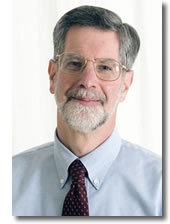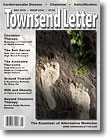Caring for Our Parents
 Howard Gleckman, a senior researcher at the Urban Institute, Washington, DC, decided to write Caring for Our Parents in part because of his own experience as his parents grew older. It gave him new insights into the gaps in our current system of care. Howard Gleckman, a senior researcher at the Urban Institute, Washington, DC, decided to write Caring for Our Parents in part because of his own experience as his parents grew older. It gave him new insights into the gaps in our current system of care.
For example, his father, who had congestive heart failure, was sent home from the hospital without instructions on what to do next. "My mother is a bright person, but nobody talked to her about what she needed to watch out for," he says. "My father had been home for a while. He was gaining weight, and my mother thought that was terrific. No one had explained to her that in congestive heart failure, weight gain is a sure sign of problems due to increased fluid buildup." Gleckman's father ended up back in the hospital.
As his father got sicker, Gleckman had to take over responsibilities such as maintaining the family checkbook. He describes his efforts calling doctors, checking with hospice, helping his mother with chores. "The busy work," he writes, "was a kind of denial. The more I chased after doctors or complained to social workers about one thing or another, the more I could avoid thinking about what really mattered: that my father was going to die soon and that the remaining time we had to get there was to be savored. So I stopped running around and just sat with him. ... The thing about someone dying in slow motion, as hard as it is, it gives you time, time to resolve old conflicts."
Communication is key
In Caring for Our Parents, Gleckman offers valuable information for everyone who is growing older, and/or may find themselves responsible for aging parents. I believe that this includes all of us!
As a researcher and journalist, Gleckman went beyond his own family, to discover how many others were dealing with the same problems of aging. Everyone wants to stay at home, he writes, but "caring for a loved one at home is complicated and demanding." He describes the public long-term care insurance systems that are used in other countries, and offers his suggestions on better ways to provide and pay for long-term care in the US.
For anyone who has aging parents, the most important thing is to talk with them while they are in good health about what they would want, what their options might be, as they continue to age. "Talking before there is a medical crisis is hugely important, and much easier than doing it after a medical crisis," Gleckman says. "During a crisis they might be too sick to have the discussion. While people are healthy, they are less threatened by the conversation."
This means taking time for the whole family, including parents, brothers, and sisters, to talk about what the possibilities might be as parents age. What is the financial situation? Where do the adult children live? Where would mom want to live if she couldn't take care of herself after dad dies?
Is it possible to discuss such serious issues ahead of time? "It does seem counterintuitive at first, until you think about it a bit." Gleckman says. "Actually it's a lot easier to have this conversation beforehand, rather than afterwards. After a spouse dies, the widow or widower will be in shock. The entire family is under great stress."
Discuss Living Wills Before They Are Needed
A living will is a document stating what you'd want done if you were unable to communicate directly about your own health care. Again, Gleckman suggests, we need to discuss living wills before they are needed. (The exact process used for a living varies from state to state. Local hospitals generally offer information about this.)
Gleckman often gives talks about elder care, generally attended by adult children who have elderly parents. People in middle age themselves need a living will and a health-care power of attorney, Gleckman says. "These are people in their 40s and 50s," he says. "I ask how many of them have a living will, and if I'm lucky, half the audience will raise their hands."
Now suppose you were in an automobile accident; who would be in a better position to make those decisions? "Imagine putting this burden on your 20-year-old, who has no idea what you would want," he says. Then again, after you've drafted your own living will, that gives you an opportunity to mention it to your parents. It gives you an opening to discuss why it's a good idea, and something that they should consider doing.
You also need a health-care power of attorney. "If you have a living will and you don't have a strong advocate, what are you going to do if some physician at the hospital doesn't comply with your living will?" Gleckman asks. "This does happen a lot. It may be because the physician has a certain practice style, or has personal religious beliefs ... there are a hundred different reasons why."
Most legal documents are stored away until they're needed. A living will, Gleckman notes, is different. "It should be distributed as widely as possible. All of your doctors should have it, and the nearest hospital should have it." When you bring a copy of your living will to your physician, it gives you an opportunity to discuss directly what your wishes are.
Finances Matter
One of the most valuable aspects of this book is its discussion of the financial aspects of growing older. Many people believe that Medicare will pay for the care that they need as they grow older, but this is definitely not true. Medicare is designed to cover the expenses of illness, only. If people reach the point where they can't care for themselves, Medicare does not cover the help they need. Gleckman offers a chapter on long-term care insurance, which is suitable for people who have significant assets, and another on Medicaid, which does cover care for people who have few assets and little income.
Resources
Caring for Our Parents: Inspiring Stories of Families Seeking New Solutions to America's Most Urgent Health Crisis. St. Martin's Press; May 2009.
Gleckman's website: http://howardgleckman.com.
Gleckman's blog, Caring for Our Parents: http://blog.howardgleckman.com.

Elaine Zablocki has been a freelance health-care journalist for more than 20 years. She was the editor of Alternative Medicine Business News and CHRF News Files. She writes regularly for many health-care publications. |



![]()
![]()
![]()

 Howard Gleckman, a senior researcher at the Urban Institute, Washington, DC, decided to write
Howard Gleckman, a senior researcher at the Urban Institute, Washington, DC, decided to write 